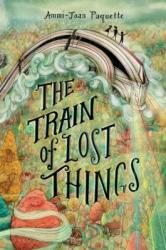
Where to start? This book was poignant, beautiful, lovely and dealt with the subject of loss, through a child’s eyes, in a way that pulled at my heart strings, big time. This beautiful tale follows a young kid named Marty as he deals with the pain and loss that comes when someone close is dying and there is nothing you feel you can do about it. When Marty’s precious possession is lost, his jean jacket scattered with buttons that represent his fondest memories with this person, at first he is devastated, but then he hears the tale of the train of lost things and he goes on a quest to find it and retrieve the precious thing he lost. Along the way he comes across two others, both on similar journeys, and discovers that what matters is not the objects themselves but the memories they represent and the love that he shares with his loved ones.
Paquette’s character Marty, approaches the subject of loss and death with a childlike curiosity. Yet throughout the story, Marty also displays the strong denial that comes with facing loss and death, questioning whether or not what is happening is really true. Marty’s love for his loved one and his need that, retrieving this jacket would make things all better, is what kept his character going. Yet in the end he realizes that life and death are not always that simple. But memories and love have a stronger power over death and loss and sometimes to overcome them you just need to escape reality to really understand that.
I don't usually pick up kids books but I picked up and read this book in one day! That is how good it was! I love this book in every way and I highly recommend it! Even though this book is for kids, I also recommend it for older people, or anyone dealing with loss, as the lessons learned can be applicable for anyone.
Thank you to the publisher Philomel Books for a ARC of this book in exchange for an honest review. This book doesn't come out till March 20 but you can put it on your hold list today!
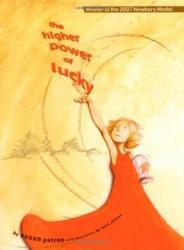
This was a very good book. I listened to it on audio and the narrator was fantastic. The climax of the book takes place during a dust storm, which is a classic case of the natural elements reflecting the story line. A bit contrived, yes, but good for young readers. The conclusion was textbook, but also okay for younger readers. If you'd like to read a good story with no surprises, this book is for you.
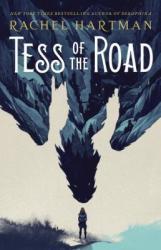
Tess Dombegh is ruined. When she was quite young, she met an ambitious young scholar who took advantage of her and left her in the family way. Since then, her main goal has been to find her twin sister, Jeanne, a husband that will save their family from their dire financial straits. Tess successfully finds Jeanne a husband, and after getting extremely drunk at their wedding and embarrassing herself and their entire family, she decides to run away.
Notice that I got through this description with nary a mention of dragons? There are dragons in this world. But only barely, hence the reason I didn't need to mention them in my synopsis. This is actually, I think, the weakest point of the book, but I'll come back to that later.
I am more conflicted about this book than I've been about any other book in recent memory. Tess, our main character, is insanely unlikable and unsympathetic, especially at the beginning. However, she's intentionally unlikable and its entirely because of the circumstances of her world are similar to that of Edwardian England in terms of how the ladies are treated. As Tess travels further down the road - often painstakingly slowly, the unnecessary and at times boring digressions in this book are legion - she learns more about who she is, who she wants to be, and how she can make her way in a world that sees her as less than a person because of her gender.
Those parts, the introspective philosophical parts, I liked. Unfortunately, they were few and far between and were including in those aforementioned digressions that had nothing to do with the plot at large. My interest in the book would wax and wane in huge swings. I did finish it, and I even liked the ending, but wow, this was often a slog.
The thing that bothered me the most about the book was almost the complete waste of the worldbuilding. There were dragons and quigutl (sic), which are like the small, less ferocious cousins of dragons, and while a quigutl was a main character, that character could have easily been a jaded staff member, or really anything else. The fantasy world didn't add to the story, and sometimes, it distracted from Tess' character development, which, at the end of the day was the point of the entire novel. I think making this book pure historical fiction (and I loved the worldbuilding and fantasy setting in Seraphina, the companion series) would've made it a more impactful, better book.
Anyway, complaints aside, at times, I found myself really loving this book, mostly on the strength of Hartman's writing and the very important messaging regarding women's rights. Overall, though, the execution left something to be desired, at least for this reader. I won't be coming back for the sequel if there is one (everything was tied up nicely, but there definitely is room for another book), but I would definitely read another book by this author. 2 stars - it was ok.
Thanks to Random House Children's and Netgalley for the eARC that I received for review consideration. Tess of the Road is released on 27 February, but you can put your copy on hold today!
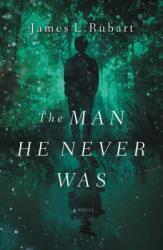
James Rubart has been one of my favorite Christian authors for a long time, and his latest, The Man He Never Was, does not disappoint. This is not just “a modern re imagining of Jekyll and Hyde,” it is a story of one man’s radical journey to discover what true love really looks like and the freedom we find through redemption.
Torren Daniels is a regular guy pursuing the career of his dreams. A football star with a loving family and everything to lose. He lives for the game, taking out his anger and frustration like most guys on the football field, through the game. But one day when he goes to far, his perfect life and career fall apart and he is left with nothing but his anger, frustration and rage at himself and his family.
Fast forward eight months, Torren has disappeared and everyone, including his wife and family, believe he is dead. Until one day he shows up in a hotel room with nothing but his wallet, the clothes on his back, and no memory of his life for the past eight months. But one thing he does know, he has come back different. More different than he has ever been before. The anger and frustration he has dealt with all of his life, seems to be gone. Instead being replaced with love, patience, and kindness, but are these changes truly real or are they simply an illusion?
What follows in the preceding days, is not only a physical journey to discover what happened to him, but a spiritual one that reveals the struggle of good and evil we all face inside ourselves and the redemptive freedom we can experience when Christ’s true love is set free within us.
Rubart’s storytelling gets down to the issues in a fast-paced way that does not dwell on flourishes and world building, as much as it does on character development. Torren is not a likeable character especially at the beginning of the book, but as the book progresses, and he goes on this journey, we see how the other relationships in his life, shape how his character responds. The other character’s in the book likewise are shaped by, and changed by, how his character responds to them, especially Torren’s wife.
Rubart’s story is highly complex, and as the story unfolds and the layers are peeled back, we see the struggle that is really going on inside Torren. Rubart approaches issues such as broken relationships, anger, loss, forgiveness, and abandonment in a way that is both realistic and extremely relatable. These issues and how they shape his character’s lives, also help shape the timber and tone of the overall story and come to a head in the conclusion of the story in an important and life changing way.
Rubart’s stories have always been complex and interesting. But one of the things I have always loved about him as an author and continue to love about him, evident in this book and the others I have read, is the way he has a way of presenting spiritual truths in a highly complex and original way but within the real world and in a way that is not overbearing, and is extremely relatable. The Man He Never Was, does not just present an updated version of the story of Jekyll and Hyde but takes the story and makes it real in a way that I never considered or imagined. Rubart takes the characters of Jekyll and Hyde and presents them as allegories as he explores the battle of good versus evil that is constantly going on inside each one of us.
Thank you to Netgalley and Thomas Nelson Fiction for an E-Arc of this book for review. This book is out February 20 but you can put your copy on hold today!
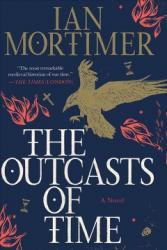
This book follows the story of two brothers John and William in 1340’s Medieval England who are suffering from the Black Death. But as their end draws near, they are given a choice that changes the course of their lives forever. They are told that they have six days left to live, which they can either spend with their loved ones, or search for salvation and redemption for their lives across the centuries; spending each one of their remaining days 99 years after the last. So, each day takes places one century after the last. The brothers choose the latter and are launched into an adventure that spans centuries in the time frame of a few days.
Observers of the world across centuries, John and William hardly recognize the world around them each day they wake up, and as their journey for salvation progresses, questions the world around them in a way that has readers questioning humanities true motives. Rather than focusing on the good things and advancements the world has made through the centuries, the characters, especially John, ponder how these advancements have brought humanity farther and farther away from God. As the years and days progress, the novel asks the question what is true salvation really and examines the idea of what is good verses bad?
When I received an ARC of this book in the mail from the publisher at first, I wasn’t exactly sure what to make of it, but as I read the back, I became excited, because this book deals with a sci-fi like subject of time travel in a way I haven’t seen before. This book took me a while to get through and it also is a book that really makes you think. Warning! If you are looking for only a traditional time travel sci-fi book, this book is probably not for you however, if you like historical fiction this book is probably more for you. This book deals with time travel in a highly conceptual way. It is a time travel book written by a very noted historian and reads very much like a historical novel with all the historical details you would find in a history book. But it is also very philosophical as the main character questions the world and the ideas in it. As this quote from John shows when he is discussing, with the family he is staying with, the bad things done by others around them.
“I myself wish for nothing more than to spend the rest of my days engaged in good deeds,’ I say. But how can I tell what a good deed is in this day and age? What is “good” and “bad” if God’s law is constantly changing? How can we do good if the meaning of “good” and “bad” are dependent on who wins the war? How can a man go through this world in sure knowledge that he is doing the right and proper thing?”
This is just one of many philosophical musings that the author poses through the book that seek to answer difficult questions and these details really make the reader think and ponder the difficult answers to questions like, what is good verses bad. These details I think also give the book a conceptual quality that puts it above the norm and makes it more than just another sci-fi book about time travel.
Ian Mortimer is an excellent historian and the historical detail in this book are incredible! He weaves together history and time travel in a highly original and interesting way that makes readers both question the world and presents readers with a clear picture of England’s evolution from a small underdeveloped town to a large industrial country that leads the world in more ways than one. I highly recommend this book for readers of historical fiction or anyone who likes highly conceptual, philosophical books that question the world and everything in it. I give this book a solid 5 out of 5 stars!
Thank you to the publisher Pegasus Books for an ARC of this book for review.
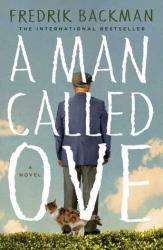
This book starts of slow and then continues a leisurely pace throughout. It was a bit hard for me to get through the first half of the novel as it mainly dealt with the thought process of a suicidal curmudgeon. But as the novel unfolds, Ove is unwrapped to show a man with quiet strength who is mourning the loss of his wife and his job. As the novel continues, we meet people who insert themselves into his life, showing him kindness and giving him purpose. I recommend this book to anyone looking for a quiet, leisurely novel about the power of friendship.
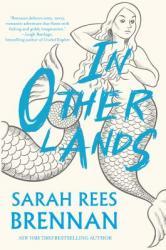
In Other Lands follows young Elliot Schafer as he tumbles through a wall (well, his teacher bribed a weird lady to let him through the wall, but whatever) into another land at age 13. He's given the opportunity to go home or go to magic school, and, like any bright young kid who has ever read, like, any book ever, he decides to go to magic school. There, he befriends golden boy warrior Luke and stoic elf warrior Serene (our fearful nerd Elliot decides to take the council course as he is deathly allergic to exercise and also, killing), and the book follows their exploits throughout the duration of their time in school.
Ok, so, that synopsis does not even begin to do this book justice. I will be forcing this into the hands of any person that walks into the teen center that says that they have even a remote interest in fantasy. Because this was so good. The best thing I've read so far this year for sure (and I've already read like 20 things this year, so that's not nothing). Anyway, on to actual information about the book.
Elliot is kind of a jerk. On purpose. But his jerkiness is mostly hilarious, and a lot of the book is his witty, spot on assessments of himself, the world, and the people around him. Luke and Serene are equally nuanced as characters and are quite lovable despite their flaws. One of my favorite parts of the book was that elf culture has the same messed up gender roles and sexism that we humans do...but the male and female roles are reversed. It makes not just for some of the most hilarious passages that I've ever read, but also serves as probably the most effective argument against said gender roles being a part of any society. It was, quite frankly, brilliant. For example: “Do not have a catfight, boys, even if it is that time of the month,” said Serene, and when she saw them staring at her, she explained: “You know—women shed their dark feelings with their menses every month? But men, robbed of that outlet, have strange moodswings and become hysterical at a certain phase of the moon?”
Insanely great egalitarian commentary aside, this was an excellent coming of age novel. The relationship and friendship between our three main characters is complex, but they all love each other and grow so much together throughout the book. And at the end of the day, this book is not really about other lands, it's about the peoples that occupy them. As an added bonus, it demonstrates that communication and shared experiences amongst peoples could almost always lead to peace. In doing that, it also effectively skewers nationalism.
I really liked the romance in the book, but you figure out Elliot's end game partner (yes, Elliot is bisexual!) at about 50% of the way through the book. They don't actually get together until the end and its one of those situations where you want to knock their heads together and yell COMMUNICATE DANG IT at them until they realize they like each other and just make out or whatever. Speaking of which, there is a lot of sex in this one. It's mostly off camera, but the one scene that makes it in is really sweet.
I obviously loved this book. If I were to try to compare it to something, it's most like Carry On by Rainbow Rowell in that it's kind of a love letter to classic fantasy (it's more Tortall to Carry On's Harry Potter) that then transcends the original source material. It's quirky enough that it won't be for everybody, but I think a lot of readers will love it. I just purchased my own copy. Like, without waiting for a Goodreads deal. It's that good. Or, in PPLD parlance, it was Bohemian Rhapsody Awesome! 5 stars.
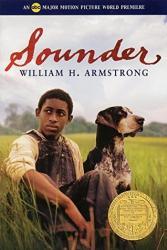
I've been on a children's book about dogs kick lately. I started with Shiloh, went to Where the Red Fern Grows, and ended with Sounder (I may read Old Yeller too). Sounder is the winner of the Newbery Medal, but it was the least powerful book out of the three. I almost feel like I may have read an abridged version of the book. The characters weren't well developed and there wasn't really a sense of desperation and overt class stratification that the book's summary promised. Overall, it was underwhelming. I'm being nice and giving it 3 stars instead of 2.
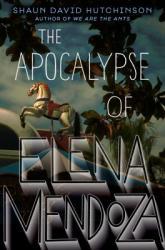
Elena is not your average teen. As the only human proven to be birthed as a result of parthenogenesis (you might know this as a “virgin birth”), she’s been hearing voices from signs and inanimate objects. But things are about to go to the next level. One day, at work, the Starbucks Siren tells her to heal her crush, Freddie, who looks fine. But then, a kid they know comes out of nowhere and shoots Freddie. Then he disappears into the sky in a flash of light. And Elena DOES heal Freddie. And then, somehow, things get even crazier as the Siren tells Elena she has to keep healing people (which leads to more disappearances) or start the apocalypse.
Personally, I’m a huge fan of unique, quirky books that are more than a little strange (I call them wonderfully weird), and so this one was right up my alley. Elena is an extremely likable character, and we get to listen to most of her thought processes as she thinks about the mundane (her crush, her relationship with her ne’er do well stepfather) and the existential (why she has the powers, and should she use them?). The supporting cast is also pretty great: Freddie, the popular art student who didn’t even know Elena’s name before she got shot, was probably my favorite character. After getting killed, she really doesn’t care so much about what people think of her, and as a result her commentary was extremely snarky, sometimes hurtful and almost always spot on. Fadil, Elena’s best friend, was a good foil as the devout teen, but he also served to demonstrate a powerful male/female friendship. Because of the philosophical nature of the book, the plot takes a backseat to character development and metaphysical conversations. I probably highlighted more in this book than I have in any other in recent memory. The downside to this, though, is that the plot sags a little in the middle and the ending left me wanting a bit more as a lot of plot lines were left dangling.
Another big selling point of the book for me was that the premise immediately made think of this show called Wonderfalls which is a bit of a cult classic from the early aughts. Later on in the book, it’s pretty clear that the author had likely just binged all of Bryan Fuller’s early shows like Dead Like Me, Pushing Daisies, and yes, Wonderfalls as this book contains elements of each of those shows, and there is a straight up name drop of a location that delighted me to no end. If you are a fan of Bryan Fuller’s properties (including recent hits like American Gods), this is a read you should definitely pick up.
If you like to think about the ethics and the big questions – why are we here, what matters, how can you decide the value of one life over another – then you will love this book. It’s a wonderfully weird thought provoking read, and while it’s not perfect, the diverse, likable cast and philosophical quandaries make it something of a rare gem of a book. 4 stars. I really liked it.
Thanks to Edelweiss and Simon Pulse for the eARC, which I received for review consideration.
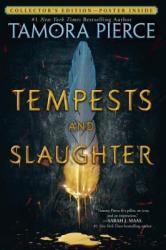
In Arram Draper’s first year at Carthak’s School for Mages, his work ethic and raw power make him something of child prodigy. As such, he is singled out for individual studies with two other similarly passionate and hard-working students: Varice and Orzone. Varice is a charming young lady with a gift for cooking magic and charm for days, and Arram quickly finds himself drawn to her, perhaps as more than a friend. Orzone is the leftover prince which means that he’s the fourth of four in line for the Emperor’s throne, though that list seems to be shortening quickly. The three soon learn that they will not just have to contend with their studies, but a growing struggle for power and control of the Empire that is threatening to change Carthak forever.
If you’ve read some of Tamora Pierce’s other works (if you haven’t, stop reading this review and pick up The Song of the Lioness quartet RIGHT NOW – it is apparently awesome in audio format as well), the lead character of this story will be familiar to you. I read and re-read her books continually in my youth, but while there was a huge nostalgia factor in reading this for me (so many easter eggs!), I absolutely would have still enjoyed it if I were totally new to the character. While you certainly should read her other works, you don’t need to have read them to enjoy this one.
Tempests and Slaughter starts when Arram is just 10. Precocious little bugger that he is, Arram started school a full year early. Because he’s so young at the beginning, the start of the book read as very middle grade to me, which wasn’t a bad thing; it just wasn’t what I was expecting. As in her other series, Pierce perfectly captures the pain and biological changes that come with puberty and I found myself transported back to those awkward times in the best of ways. After Arram gets a little older and meets up with Varice and Orzone, the book begins to pick up as all three characters get developed and the worldbuilding picks up. This is definitely a book that’s primarily focused on character development and worldbuilding, but as Arram is a lovable character and the worldbuilding is rich, the almost total lack of plot did not bother me too much. A very interesting mystery appears later in the book, though it felt a little rushed and the conclusion a bit forced. However, it nicely sets things up for the next installment which I will unquestionably be pre-ordering.
All in all, this was a great read. If you like your fantasy with a healthy dose of complex characters and intricate world building, you’ll really enjoy this one. I’m going to go re-read some backlist Tamora Pierce now, and I suggest you do the same. 4 stars.
Thank you to Random House and Netgalley for the free electronic copy for review consideration. Tempests and Slaughter is released on 06 February, but you can put your copy on hold today!

Max's parents have dashed off on an unexpected adventure and left their 12 year old son Max behind, alone...well, his grandmother is around to watch over him, but she is busy being a librarian. Max has to fend for himself and picks up a part time job as a solutioneer (sounds like engineer, but much more mysterious). His first task is to find a lost pet and this snowballs into many intricately involved adventures that will keep readers turning pages with anticipation to find out what this determined young man will do next. The Book of Lost Things, by Cynthia Voigt, is sure to please children 9 - 13 who enjoy a good mystery.
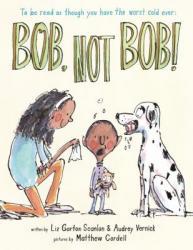
For the parent, teacher or librarian who loves a good read aloud that can only be done with "the voices" - this is your book. A boy with a cold in his head calls for his mom, but it sounds like "Bob," and of course his dog, Bob, comes running instead. Hilarious situations will tickle reader and listener alike in Bob, Not Bob! by Liz Garton Scanlon and Audrey Vernick with pictures by Matthew Cordell. For ages 3 - 7.
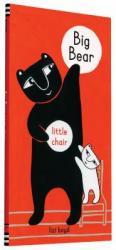
Big Bear Little Chair by Lizi Boyd is reminiscent of the block cut, three color art children's books of the 40's and 50's. Very simple text accompanies the beautiful illustrations depicting size comparison. Each page is a story unto itself, and children will love filling in the details of why the big zebra has such a little broom or why the big bird is carrying a little red umbrella. Perfect for ages 2 - 5.
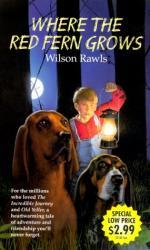
This book is so well written that it didn't matter that I had nothing in common with the narrator and no interest in hunting. In fact, I felt sorry for the coons. This is a story of love and devotion that had me enthralled, especially in the second half. The ending, while a bit contrived, was still beautiful.
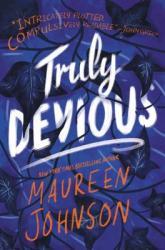
Stevie Bell loves all things crime, true or otherwise. She loves to dive into the fictional encounters of the likes of Hercule Poroit and Sherlock Holmes almost as much as she loves to solve cold cases. So when she gets the opportunity to study at Ellingham Academy, site of one of the most famous unsolved murder/kidnapping cases of all time, she jumps at the chance. She doesn't get too far into her murder investigation, however, when a fellow student is found dead in the same tunnel as a murdered girl from before.
For the most part, this is just a straight-up mystery with a quirky setting and side characters, but it really works. The book goes back and forth from the events of the 1939 Ellingham murders to present day, and I found myself equally interested in both stories. Our main character, Stevie, is extremely likable, and gives us some smart, biting commentary about her life and her classmates along with a lot of interesting tidbits about past crimes and mystery authors. Stevie's classmates all have distinct personalities and are quite the diverse cast of characters. Students at Ellingham are selected for having some sort of ability or interest, and her roommates are an artist, an inventor, a coder, a writer and a YouTube star which makes for some fun interactions and conversation in the group. There's a bit of a meh romance, but it didn't detract from the rest of the book and it will be interesting to see where that heads in the sequel.
The main appeal here is the dual mysteries. Both were a lot of fun to read, and I was dead wrong about the identity of the present day killer which is always fun. Really, the only downside for me was the ending. It ends on a massive cliffhanger, and I actually wish a few things were a bit more tied up. I found it to be jarring and a bit off-putting. That said, I'll probably check out the sequel.
If you are looking for a really solid mystery featuring clever and engaging characters, then this is for you! You can put Truly Devious on hold now - thanks to Edelweiss and HarperCollins for the electronic review copy. If it weren't for that ending it'd be a 4 star read for me, but...3 stars.
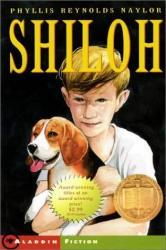
Shiloh is a sweet story about a boy's love for his dog. Well, Shiloh isn't actually his but is owned by an abusive neighbor. Marty's devotion and determination to save Shiloh is touching. The narration is spot on. Well done!
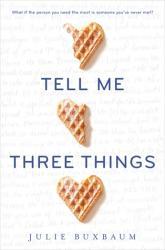
I think this book would have been better if I had read it instead of listening to it. The person who voiced it was highly annoying. Too bad, it may have gotten 4 stars otherwise.
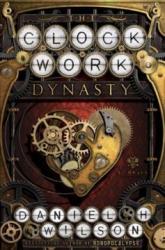
When I picked up this book, I have to admit, I was surprised, because sci fy steam punk fantasy stories is not the type of book I usually read, yet it ended up being so much more than I had imagined. The Clockwork Dynasty is not just a book about a race of humanlike mechanical creatures or avtomats that secretly live among us and are fighting a war that has raged for centuries, but it’s a story about life and the constant search for meaning and purpose.
This book waffles back and forth between present day Orgon, Washington and other places, and the 1700’s beginning in Russia and taking the reader on a journey through history and time. And while this may bother some people, the non-linear storytelling I think, adds so much more to the book and allows the author to unfold the story in a deeper more meaningful way.
In present time it follows the story of June someone who has made a career in ancient technology, ever since an encounter she had a child with her grandpa changed her perception of the world and started her fascination with this avtomat technology. A couple years after her grandfather’s death she receives a avtomat artifact that will cause her to team up with an avtomat named Peter, launch her into a great adventure in the secret avtomat
world, and ultimately determine this race’s extinction or survival. In
the 1700’s it follows the story of brother (Peter) and sister (Elena) two humanlike avtomats that were resurrected by a Russian clock maker using something called an anime which serves as the Avtomat’s heart and soul. As they live through the years they spend it hiding their secret, trying to blend into society, and fighting a war that has been raging among their own race for centuries.
This story explores the character’s constant search for meaning in a way that is both at times sad and extremely insightful. In the book each avtomat’s anime is marked with a Pravda or a special word that is their bond and command. As long as they satisfy their Pravda, they are at peace, otherwise they suffer. In Peter’s case this word is justice. As the book progresses we see his idea of justice shift and change as he lives through the years. Through a fascinating inner dialogue, Peter perception shifts from gaining justice simply by serving rulers in war to something far deeper and more moving, as this quote, when he encounters a dying soldier on the enemy’s side in the battlefield, suggests:
“Once Pravda was clear to me. By obeying my emperor all was well. But what was simple is becoming complex. I can see no evil inside this grievously wounded man, only honor. And though no clockwork flutters beneath his throat, I can see the inevitable forces that led him here, through no fault of his own, fating him to die in the shadow of this crumbling wall.”
As the book progresses a new perspective of right and wrong emerges leaving him questioning not only who he is but why he was made.
Another major theme this story also explores is the theme of war. As Peter recounts from his past, countless experiences on various battlefields throughout his life, and in the present, his own thoughts on his own race’s war; the reality of war is pressed heavy on the reader making this book at times very depressing, sad, and dark.
This reality is made even more real by the moving prose and incredible worldbuilding that takes place throughout the book. Another reason I love this book is the incredible character development between Peter and Elena.
How she is treated by him as a little sister at the beginning of the book, and how he sees her changes through the book from a little girl needing his protection to a sophisticated, wise learned, woman who’s one desire is to make her own way in the world is absolutely incredible. Daniel H Wilson does an amazing job of weaving together past and present into an engaging literary story that has something for everyone. Thank you to Doubleday books and Netgalley for an e- ARC in exchange for an honest review!
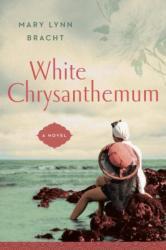
This was a very difficult book to read, but it was so beautifully written. Dual timelines tell the story of sisters separated by war. You will learn Hana's story from 1943 in Korea when she is taken by Japanese soldiers to become a "comfort woman" in Manchuria (the details of which are haunting).
Hana's sacrifice allows her younger sister, Emi, to stay on their island home off the coast of South Korea, but she is also tormented by the effects of World War II and the Korean War. We meet Emi as an older woman in 2011, still trying to find out what happened to her sister. Both stories are compelling and heartbreaking, but showcase the strength of these women to survive. Highly recommended.
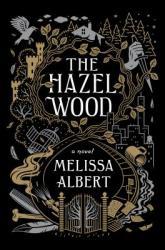
Alice and her mom, it seems, have always been plagued by bad luck no matter where they go. One day when Alice’s mom disappears she and a friend set out on a journey to find her. This journey, they soon discover, takes them on an adventure to a place called the Hinterland. It's a place which she has only read about in her grandmother’s stories -- a reclusive authoress with a cult following who published a volume of pitch-dark fairy-tales and then quietly disappeared along with most of her books. This place, she soon discovers, is also much more than meets the eye. It’s a place where fairy-tales are real, fantastical and frightening monsters roam freely, and stories are woven into the fabric of its reality.
Melissa Albert’s tale is filled with dark and vivid writing, and its reliance on the power of stories is something that drew me into this book. It grabbed hold of me and never let me go. A page turner with twist and turns every which way, it has become one of my all-time favorite reads this year. Filled with Original Fairy Tales, a frightening adventure, and one young girl's fantastical journey into the heart of story itself, The Hazel Wood is destined to become a classic in fantasy literature that will leave an impression for generations to come.
Definitely put it on your to read list. It isn't out until January 30, but you can put your copy on hold today! Thank you to Netgalley, Flatiron Books, and Macmillan for an ARC of this book in exchange for an honest review.


